It is a Wednesday morning in the main courthouse of Abu Dhabi. Outside the Judiciary building there are hordes of people standing around smoking, talking on the phone, waiting around nervously. Their clothes are as diverse as their faces, with the familiar styles of Emerati Konduras (long flowing robe topped with either a head cover wrapped around the head or position over the head and held in place with that black rope) being the more dominate choice of clothing over the western business suit. I slip passed the metal detector after surrendering my phones, my bag is filled with recording equipment but this seems to be of no interest or concern to security. After all, beyond all those involved in legal proceedings, press people are also typical visitors here.
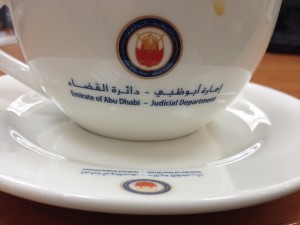 Once inside you arrive in a big square surrounded by several floors running in a circle. There are screens and signs in Arabic and English indicating things like “Bailiffs”, “Criminal Court”, “Prosecutors Office”, etc. Again anywhere you turn there is an Emirate gentleman on a phone, often wearing a light black cloth jacket over his normal clothes, which I am told indicates this person is a lawyer. Almost all the ladies present in the courthouse are wearing Abayas, some that cover there faces, others just covering the head. I am told even some non-Muslim ladies who come to court wear it in hopes of winning over the authorities. Every few steps there is also some kind of security officer. Many of them have unimpressive uniforms with the words “Security” on their backs, these people are often foreigners from India or Pakistan, and they speak with everyone in English. Then there are the men and women in military type uniforms, featuring golden ropes over their shoulders, camouflage type colors, and a few prestigious badges or bars on their chests.
Once inside you arrive in a big square surrounded by several floors running in a circle. There are screens and signs in Arabic and English indicating things like “Bailiffs”, “Criminal Court”, “Prosecutors Office”, etc. Again anywhere you turn there is an Emirate gentleman on a phone, often wearing a light black cloth jacket over his normal clothes, which I am told indicates this person is a lawyer. Almost all the ladies present in the courthouse are wearing Abayas, some that cover there faces, others just covering the head. I am told even some non-Muslim ladies who come to court wear it in hopes of winning over the authorities. Every few steps there is also some kind of security officer. Many of them have unimpressive uniforms with the words “Security” on their backs, these people are often foreigners from India or Pakistan, and they speak with everyone in English. Then there are the men and women in military type uniforms, featuring golden ropes over their shoulders, camouflage type colors, and a few prestigious badges or bars on their chests.
I’m being shown around by a friend rom 7 Days Dubai, who is a regular in this place. The Philippino ladies behind the counter of the cafe greet him like a preferred customer and as we walk around different lawyers and court reporters stop us for a quick word. As we walk by one hallway my friend gestures for me to observe carefully as there are men sitting on benches along the wall. “These men are often here because they fell into debt, which is a punishable offense in this country.” As we walk I notice these guys have a very hopeless and desperate demeanor about them, a few are even wearing leg chains, the kind you’d see a serial killer on trial in the US wearing to court.
On the way to criminal court we pass a door with two guards, and surrounding them are a mix of men and women staring nervously at the door something like when you’re at the arrivals gate of an airport waiting for someone to emerge. “These are family members hoping to see their detained loved one.” I take a second look at their concerned faces, I find myself imagining the kinds of charges their people face. Before I can think any further about it, we’re passing through another metal detector that seems to be more of a decoration. We pass through two double doors and directly into a moderately crowded courtroom with a case already in progress. There is a panel of judges sitting behind the long, raised desk, with the middle judge, an older gentleman with dark skin and a stern look, doing all the talking. Facing him and looking very concerned are two small podiums with middle aged men in western business suits who seem to be translating or arguing their case.
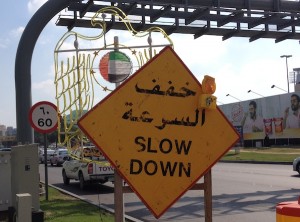 Despite having studied arabic, I’m struggling to understand what is going on. Thankfully there is a court reporter seated in our row and at the beginning of each case he gives us a quick rundown of what is going on. “This man is accused of drinking alcohol and partying,” inside the bullet proof booth I can see a short Emirati man wearing a uniform black shirt and a yellow stripe on his arm. The yellow stripe indicates a detainee facing a punishment of a year or less. Before I even understand if he is guilty or not the next case begins. The next case seems to be another man accused of drinking and partying, which makes me wonder if these aren’t the most typical charges this judge sees. This time an older woman wearing a colorful headscarf stands up in the audience and asks permission to submit some documents. Something about her somber and desperate demeanor tells me that it is her son’s freedom which hangs in the balance. The judge shows no sympathy, but hears her out, and eventually she is returned to her seat. 15 minutes later, two short Indonesian ladies in green abayas are standing at the podium in front of the judge. Alongside them is a translator relaying messages to and from the judge. In the glass box there is a middle aged man who’s body language tells me he is very nervous. Apparently somewhere between them there is an accusation of sex outside of marriage. The discussion is long but in the end, the judge says his piece and all parties are escorted out of the room by security guards. As the two timid ladies stand outside the courtroom we follow them. A female officer slaps ankle bracelets on each of them, and they shuffle awkwardly onto the elevator. We get in just behind them and considering what we just observed, it is a struggle to keep a conversation going as the elevator heads towards the ground floor.
Despite having studied arabic, I’m struggling to understand what is going on. Thankfully there is a court reporter seated in our row and at the beginning of each case he gives us a quick rundown of what is going on. “This man is accused of drinking alcohol and partying,” inside the bullet proof booth I can see a short Emirati man wearing a uniform black shirt and a yellow stripe on his arm. The yellow stripe indicates a detainee facing a punishment of a year or less. Before I even understand if he is guilty or not the next case begins. The next case seems to be another man accused of drinking and partying, which makes me wonder if these aren’t the most typical charges this judge sees. This time an older woman wearing a colorful headscarf stands up in the audience and asks permission to submit some documents. Something about her somber and desperate demeanor tells me that it is her son’s freedom which hangs in the balance. The judge shows no sympathy, but hears her out, and eventually she is returned to her seat. 15 minutes later, two short Indonesian ladies in green abayas are standing at the podium in front of the judge. Alongside them is a translator relaying messages to and from the judge. In the glass box there is a middle aged man who’s body language tells me he is very nervous. Apparently somewhere between them there is an accusation of sex outside of marriage. The discussion is long but in the end, the judge says his piece and all parties are escorted out of the room by security guards. As the two timid ladies stand outside the courtroom we follow them. A female officer slaps ankle bracelets on each of them, and they shuffle awkwardly onto the elevator. We get in just behind them and considering what we just observed, it is a struggle to keep a conversation going as the elevator heads towards the ground floor.
In the remaining time I had at the courthouse I watched everyone going about their business. To some it might seem chaotic, but in reality, my very experienced friend assures me, this is one of the most organized court systems in the Middle East. Still it seems quite outdated, especially accusations of sex out of marriage or drinking alcohol. Granted these things are forbidden for religious reasons, but it seems a great strain to keep them as courtroom worthy topics. Prison sentences for those who are in debt is also a troubling phenomenon. I’m told this happens even for small sums of money and none of the men in that hall way looked like high rollers burning money on purpose. I also wondered how you pay off a debt if you are in prison.
That same day I return to Dubai after spending 24 hours in AbuDhabi and see the very down to earth, straight talking Prime Minister of the UAE Sheikh Mohammed bin Rashid Al Maktoum being interviewed on CNN. After driving the reporter out of Dubai (himself) and into the desert, he talks about the court system. He acknowledges that the system is flawed and in some ways has not yet caught up to the reality of the UAE as an open place where people from all over the world live. Obviously he is the representative of the country and speaks with a certain degree of concern for public perception, but even still, interesting words from someone who has great influence over what happens to this country in the next 25 years.
Many of the successes of this city and this country are talked about and celebrated throughout the world. It is indeed something to behold and to some extent be inspired by. On the other hand it is important to remember there are still injustices in this country, many of which could be remedied. One visit to a courthouse can illustrate both sides of this complicated coin.
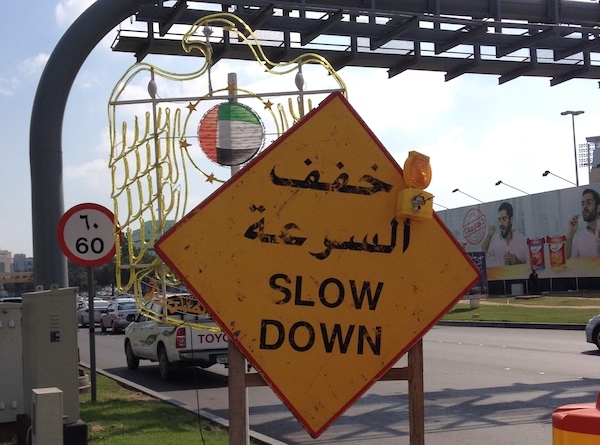
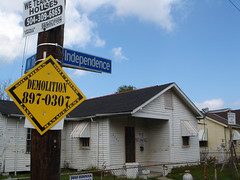

 I hadn’t thought much about
I hadn’t thought much about 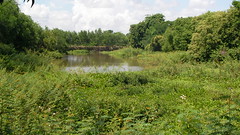 As I type this entry I’m listening again to a recent episode of CBC radio’s
As I type this entry I’m listening again to a recent episode of CBC radio’s